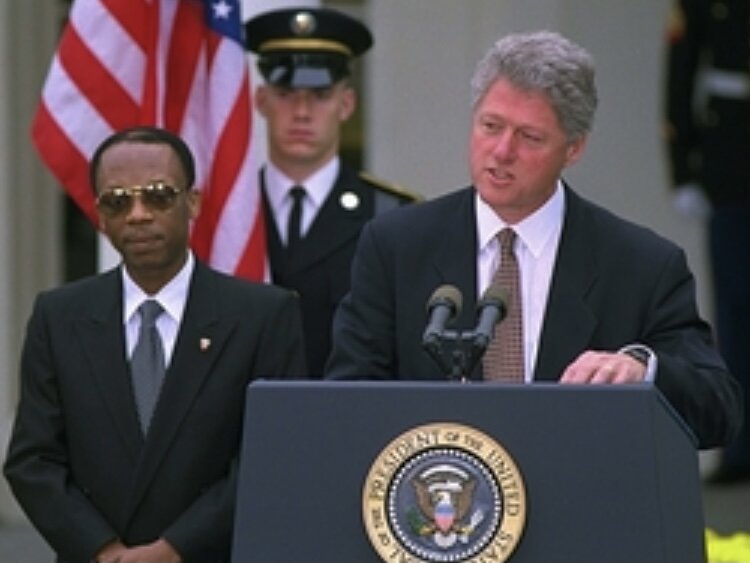The GAO echoed those concerns, noting in May 2011, “funding for approved projects is uneven across sectors and is not necessarily aligned with Haitian priorities."
Bill's role as unofficial “viceroy" raised questions in the Haitian community because of the Clintons' penchant for mixing politics with crony business arrangements in Haiti.
Back when Bill had been appointed special envoy for the United Nations in 2009, the Haiti Observateur challenged both Clintons to "come clean about [Bill's] relationship to the former Haitian president and he and his wife's business dealings in Haiti."
The link is here.
"There have been whispers and rumors for quite a while about the Clintons' choice connections to the former president and particularly the telephone business in Haiti," the paper said.
As president in 1994, Bill Clinton had sent troops to Haiti to return to power Jean-Bertrand Aristide, the duly elected president who had been forced out in a 1991 coup. While president, after he was restored to power, a special deal was granted to a small US-based company called Fusion Communications. (The prime minister of Haiti at the time was Aristide friend and ally René Préval, who was president at the time of the earthquake.)
Clinton and Aristide
The Haitian government-owned telecom company, Teleco, granted Fusion long-distance minutes from the United States to Haiti at a deeply discounted price. With a large number of Haitians living in the United States and calling home, this was a big market.
Fusion was a relatively small player in the long-distance telephone market. But it was top-heavy with operatives and politicians closely aligned with Bill and Hillary. The board of directors included Tom "Mack" McLarty, Bill's former chief of staff, and was headed by Marvin Rosen, who had been chairman of the Democratic National Committee's finance committee during Bill's 1996 reelection campaign.
It was under Rosen's tenure that the notorious White House fundraising coffees, rental of the Lincoln Bedroom to large contributors, and foreign donations from China and Asia had occurred.
Also on the board was Ray Mabus, a former Mississippi governor whom Bill had appointed ambassador to Saudi Arabia. Teleco's special arrangement with Fusion was supposed to be public, in keeping with the regulations and laws of the FCC. But the company worked hard to keep it secret.
As Wall Street Journal columnist Mary Anastasia O'Grady, who broke the story, wrote, "By law the agreement is a public document but Fusion wouldn't give it to me until the FCC required them to do so."
It took her eight years to get a copy of the contract. It's easy to see why. The contract gave Fusion access to the Haitian telephone network at a rate of twelve cents a minute, even though the official FCC rate was fifty cents a minute.
In short, it was a sweetheart deal. Fusion says it “never made any improper payments or engaged in any improper activity with regard to its relationship with Teleco." But of course, it didn't have to. After the 2010 earthquake, more than a decade later, there were new telecom prizes available in Haiti.
The system was set up so that decisions on doling out contracts and projects went through the Clintons. In the months following the earthquake, the Clintons began pushing the idea of a wireless mobile phone money-transfer system for Haiti.
The idea was to enable friends and relatives to send money directly to people in the quake-ravaged country. Hillary's USAID was quick to send taxpayer money via a grant; it also organized the effort.
The Bill Gates Foundation also came on board. The Haiti Mobile Money Initiative also offered incentive funds to companies who would establish mobile money services in the country.
The link is here.
The initiative's big winner was Digicel, a mobile phone company owned by Irish billionaire Denis O'Brien. Digicel received millions in US taxpayer money for its TchoTcho Mobile system. (TchoTcho means "pocket money" in Creole.)
The USAID Food for Peace program, under direct control of the State Department through Cheryl Mills, chose the TchoTcho system for its money transfers. Haitians were given cell phones and a free TchoTcho account.
When Haitians used the system, they paid O'Brien's company millions in fees. They also became users of O'Brien's TchoTcho program. O'Brien had bought the company in 2008.
After the project's launch, Digicel's mobile phone subscriptions soared and its profit margins rose, winning praise from investors. By 2012 Digicel had 77 percent of the Haitian mobile phone market, a rise fueled in part by the fact that it was a digital bank supplier.
Was the mobile money system a good idea? Very possibly it was. But the trouble was not in the idea itself; rather, it was the fact that it was helping make O'Brien lots of money.
Allegations that are congruent with other aspects of this story. Judge the credibility of this site for yourself. A lot of my aim is to help the public see through disinformation to learn the actual truth. Just that there us so much disinformation proves the existence of a massive coverup perpetuated by individuals of boundless means. The link is here.
From April 2011 to March 2012 Digicel's revenues increased 14 percent and its subscriber base jumped 27 percent. By September 2012 Haiti had overtaken Jamaica as Digicel's most profitable market.
The Haitian market became key to the success of Digicel. O'Brien granted himself $300 million in dividends from Digicel in 2012. O'Brien was in turn making money for the Clintons.









